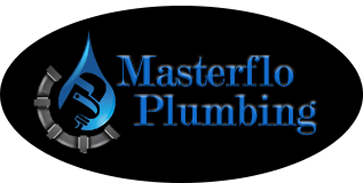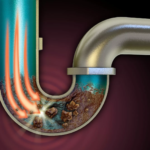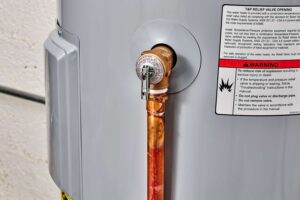Dealing with bathroom drain blockages? Start with chemical drain cleaners designed to dissolve clogs effectively. Use a plunger for creating a seal over the drain and applying proper plunging technique. Consider a drain snake for reaching deep into pipes to tackle hair clogs. Don't forget natural remedies like baking soda and vinegar for a cost-effective solution. Hot water flushes and wet/dry vacuums are also helpful. For more advanced solutions, professional plumbing services offer expertise in identifying root causes and providing long-term solutions. Keep exploring for additional effective ways to handle bathroom drain blockages.
Key Takeaways
- Chemical Drain Cleaners dissolve hair, grease, and soap scum effectively.
- Plungers create a seal for better suction over the drain opening.
- Baking Soda and Vinegar create a natural chemical reaction to clear blockages.
- Hot Water Flush softens substances and improves drainage flow.
- Professional Plumbing Services offer expertise in identifying and solving root causes of blockages.
Chemical Drain Cleaners
If you're dealing with a stubborn bathroom drain blockage, using chemical drain cleaners can be a vital solution. These cleaners work by breaking down clogs in your pipes, allowing water to flow freely again. When selecting a chemical drain cleaner, make sure to follow the instructions carefully to avoid any mishaps.
Most chemical drain cleaners are designed to dissolve hair, soap scum, grease, and other organic materials that may be causing the blockage. They are typically poured directly into the drain and left for a specified amount of time to work their magic. Remember to wear gloves and protective eyewear when handling these cleaners to prevent any skin irritation.
It's essential to use chemical drain cleaners sparingly and as a last resort. Overuse of these products can damage your pipes over time. If the blockage persists after using a chemical drain cleaner, it may be time to explore other methods such as plunging or reaching out to a professional plumber for assistance.
Plunger
When facing a bathroom drain blockage, utilizing a plunger can often provide an effective and immediate solution. Here are four tips to make the most of this handy tool:
- Choose the Right Plunger: Opt for a cup-shaped plunger with a flange for better suction. This design is ideal for creating the necessary pressure to dislodge the clog effectively.
- Create a Seal: Guarantee the plunger completely covers the drain opening to create a vacuum seal. This seal is essential for generating the suction needed to push or pull the blockage free.
- Use Proper Technique: Position the plunger over the drain and push down gently, then pull up with force. Repeat this plunging motion several times to break up the clog.
- Be Persistent: If the blockage doesn't clear immediately, try plunging multiple times. Sometimes, it may take several attempts to completely remove the obstruction and restore proper drainage.
Drain Snake
To effectively tackle stubborn bathroom drain blockages, consider using a drain snake as a practical and efficient tool. A drain snake, also known as a plumber's snake or auger, is a long, flexible tool that can reach deep into your pipes to dislodge clogs. This tool is particularly useful for hair clogs or other debris that a plunger might not be able to remove.
Using a drain snake is simple. Insert the snake into the drain and twist the handle as you push it further down the pipe. The snake's design allows it to latch onto the blockage and pull it out as you retract the tool. It's critical to be gentle to avoid damaging your pipes while effectively removing the obstruction.
Drain snakes are readily available at hardware stores and are a cost-effective solution for minor blockages. If you're facing a persistent clog that won't budge with a plunger, a drain snake could be the next step before calling a professional plumber.
Baking Soda and Vinegar
Consider utilizing a mixture of baking soda and vinegar as a natural and effective solution for clearing bathroom drain blockages. This DIY method is safe for both your pipes and the environment. Follow these steps for best results:
- Pour Baking Soda Down the Drain: Start by pouring about 1/2 cup of baking soda directly into the clogged drain. Make sure it goes down the drain as smoothly as possible.
- Add Vinegar: Next, pour a mixture of 1 cup of vinegar and 1 cup of hot water down the drain. The chemical reaction between the baking soda and vinegar will help break down the blockage.
- Let It Sit: Allow the mixture to sit in the drain for at least 30 minutes. This gives it enough time to work on dissolving the blockage.
- Flush with Hot Water: Finally, flush the drain with hot water to wash away the loosened debris and clear the pathway.
This simple and cost-effective solution can often unclog minor blockages without the need for harsh chemicals.
Hot Water Flush
If the baking soda and vinegar method did not completely clear the blockage, try flushing the drain with hot water to further break down any remaining debris. Boil water in a kettle or on the stove, then carefully pour it down the drain in two to three stages. The hot water can help dislodge and dissolve any grease, soap scum, or small blockages that may be causing the issue.
Hot water is effective in breaking down organic materials that could be clogging your drain. The heat can soften these substances, making it easier for them to flow through the pipes. Additionally, hot water can help flush out any leftover residue from previous cleaning methods, improving the overall drainage of your sink or shower.
Remember to use caution when handling hot water to avoid burns. If you have PVC pipes, be mindful that boiling water could potentially damage them. After flushing with hot water, test the drain to see if the blockage has cleared. If the issue persists, you may need to try a more direct approach, such as using a wire hanger to physically remove the debris.
Wire Hanger
When dealing with stubborn blockages in your bathroom drain, a wire hanger can be a handy tool to physically remove debris that other methods may have missed. Here are some tips on how to effectively use a wire hanger for unclogging your drain:
- Straighten the Hanger: Unwind the wire hanger and straighten it as much as possible to create a long, flexible tool for reaching deep into the drain.
- Create a Hook: Bend one end of the hanger to form a small hook, which will help you grab onto hair, soap scum, or other debris causing the blockage.
- Insert and Rotate: Carefully insert the hooked end of the hanger into the drain and start rotating it to catch onto the clog and pull it out.
- Flush with Hot Water: After removing the blockage, flush the drain with hot water to make sure everything has been cleared out properly and to prevent future clogs.
Wet/Dry Vacuum
To tackle tougher blockages in your bathroom drain, a Wet/Dry Vacuum can be a powerful tool for quickly and effectively removing debris that is causing the clog. This versatile vacuum is designed to handle wet messes, making it ideal for unclogging drains. To use a Wet/Dry Vacuum for this purpose, start by setting the vacuum to suction up liquids. Place the hose directly over the drain and create a secure seal to guarantee maximum suction power. Turn on the vacuum and let it work its magic, sucking up the blockage causing the issue.
The strong suction power of the Wet/Dry Vacuum can pull out hair, soap scum, and other debris that may be obstructing the flow of water in your drain. It is a convenient and efficient way to clear out stubborn clogs without the need for harsh chemicals or expensive plumbing services. Remember to clean out the vacuum thoroughly after each use to prevent any lingering debris from causing future blockages.
Enzyme Drain Cleaners
Using enzyme drain cleaners can be a natural and effective way to break down organic matter causing blockages in your bathroom drain. These cleaners contain helpful bacteria and enzymes that eat away at the buildup in your pipes, helping to clear the blockage without harsh chemicals. Here are four tips for using enzyme drain cleaners effectively:
- Choose the Right Product: Look for enzyme drain cleaners specifically designed for bathroom drains to guarantee they target the organic materials commonly found in these pipes.
- Follow Instructions Carefully: To achieve the best results, make sure to follow the manufacturer's instructions regarding application and wait times.
- Regular Maintenance: Use enzyme cleaners preventatively on a regular basis to keep your drains clear and prevent future blockages from occurring.
- Patience is Key: Enzyme drain cleaners work over time, so allow an adequate period for the product to break down the blockage before expecting results.
Boiling Water
Give some thought to pouring boiling water down your bathroom drain as a simple and effective method to help clear minor blockages and remove buildup. Boiling water can assist in dissolving and dislodging grease, soap scum, and other residue that may be causing the blockage in your drain. The heat from the boiling water can also aid in breaking down organic materials that have accumulated in the pipes.
To use this approach, boil a pot of water on the stove or use a kettle. Once the water reaches a rolling boil, carefully pour it directly down the drain in a slow and steady stream. Be cautious not to splash yourself with the hot water. Allow the boiling water to work its magic for a few minutes before testing the drain to see if the blockage has cleared.
It's important to note that boiling water is best suited for minor blockages and should not be used on drains that are completely clogged. If the blockage persists after trying boiling water, you may need to explore other solutions such as a drain snake or professional plumbing service.
Professional Plumbing Service
If you come across persistent drain blockages that boiling water or other DIY methods cannot solve, seeking professional plumbing service is advised. Professional plumbers have the expertise and tools to tackle even the toughest clogs efficiently and effectively.
Here are four reasons why hiring a professional plumbing service is a wise choice:
- Advanced Equipment: Plumbers have access to specialized tools such as drain snakes, hydro-jetting equipment, and video inspection cameras to diagnose and clear blockages.
- Expertise: Professional plumbers have the knowledge and experience to identify the root cause of the blockage and implement the most suitable solution.
- Prevent Further Damage: Incorrect DIY methods can sometimes exacerbate the blockage or damage your pipes. Professional plumbers can avert such issues and make sure the problem is resolved correctly.
- Long-Term Solutions: By addressing the underlying cause of the blockage, professional plumbers can provide long-term solutions to prevent future clogs, saving you time and money in the long term.
Conclusion
Masterflo Plumbing is North Georgia's most trusted plumbing company. With over 20 years of experience and staffed with master plumbers, our team is equipped and ready to serve your plumbing needs. Whether you need water heater repair or replacement, or have minor and major plumbing problems, you can count on Masterflo Plumbing for all your plumbing needs throughout Cherokee County and metro Atlanta.


